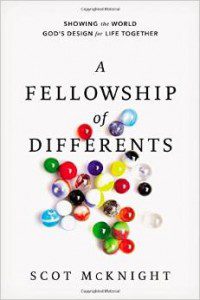 Grace can be a word that tells the whole story of the gospel and the Christian faith; it can also be used to distort the whole story. Some people use the term “grace” to put the hammer down on people — something I call “grace grinding” — while others turn most everything into grace. [This post from A Fellowship of Differents.]
Grace can be a word that tells the whole story of the gospel and the Christian faith; it can also be used to distort the whole story. Some people use the term “grace” to put the hammer down on people — something I call “grace grinding” — while others turn most everything into grace. [This post from A Fellowship of Differents.]
Grace is a wonderful, wonderful, wonderful word. One of the very best terms in the whole Bible, so it is vital to get a good grip on grace. I have a section on this term in my new book called “Space for Grace” that follows a chapter called “Space for Yes” (God’s Yes to us in Christ). (I really like Mike Glenn’s book The Gospel of Yes.)
Two problems: reducing it by making it too many things, reducing it by focusing on the negative. Each is the short story version; we want the full story.
Sadly, the full story of grace is often reduced to a short story. Frederick Buechner tilts in this direction when he says that “a good sleep is grace and so are good dreams.” “The smell of rain is grace.” I like dreamy sleep and the pitter-patter of rain, but we do the word “grace” a disservice when we reduce it to pleasant life experiences.
The second misunderstanding is a sad face — that is, when grace is what God does for bad people in such a way they are reminded how bad they are. Here’s the short story it tells: “God was against us, but God was gracious and now we’re just flat-out lucky to be on his good side.” Here are three standard definitions of short-story grace:
B. B. Warfield: “Grace is free sovereign favor to the ill-deserving.”
Jerry Bridges: “[Grace] is God reaching downward to people who are in rebellion against Him.”
Paul Zahl: “Grace is unconditional love toward a person who does not deserve it.”
In each of these three definitions, the accent falls on our unworthiness. That’s the short story of grace. Anyone who stops there is telling a short story and in fact that story distorts the story of grace.
The full story starts where these definers started, but it goes well beyond. As Anne Lamott once put it, “I do not understand the mystery of grace — only that it meets us where we are but does not leave us there.” That’s the full story of grace — one that invades my space, but never leaves me in my space. No, grace creates new space.
It is also vital to know that grace does not begin with God’s anger or wrath. No, God’s grace begins on the Yes-note of love; grace begins with his unconquerable love for us. He gives us a place “in Christ,” and then God’s grace empowers us to thrive “in Christ.” Grace invades our world to transform us until we are fully outfitted for eternal life. Grace is God’s loving, new creation power at work in us. Kathleen Norris stands closer to the apostle Paul when she describes God’s artistic grace this way: “Peter denied Jesus, and Saul persecuted the early Christians, but God could see the apostles they would become.” Dorothy Sayers once said that the artist does “not see life as a problem to be solved, but as a medium for creation.”
The church, if it is going to be the church God designed it to be, must become a space for the full story of God’s artistic grace—the story about where we were, where we are now, and where we will be someday.
Notice how often — dozens of times — The Man Paul uses “grace” for his entire life. Read these lines from Paul carefully:
But when God, who set me apart from my mother’s womb and called me by his grace, was pleased to reveal his Son in me so that I might preach him among the Gentiles. (Galatians 1:15 – 16)
God revealed himself to Paul personally by grace.
James, Cephas and John, those esteemed as pillars, gave me and Barnabas the right hand of fellowship when they recognized the grace given to me. They agreed that we should go to the Gentiles, and they to the circumcised. (Galatians 2:9)
Paul’s mission to the Gentiles was God’s grace, as evidenced here in his letter to the Romans:
Through him we received grace and apostleship to call all the Gentiles to the obedience that comes from faith for his name’s sake. (Romans 1:5)
Each of our “gifts” is from God’s grace:
We have different gifts, according to the grace given to each of us. If your gift is prophesying, then prophesy in accordance with your faith. (Romans 12:6)
Here is grace on top of grace on top of grace — the apostle says everything he is and everything he has done is God’s grace!
But by the grace of God I am what I am, and his grace to me was not without effect. No, I worked harder than all of them — yet not I, but the grace of God that was with me. (1 Corinthians 15:10)
Yes, Paul has a terrible past to tell, and grace includes that story. Paul’s idea of grace will not stop with a short story; it tells the whole story of that grace at work in us.
It tells a story of God finding us where we are to make us fit for where God is.











